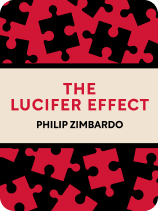

This article is an excerpt from the Shortform book guide to "The Lucifer Effect" by Philip Zimbardo. Shortform has the world's best summaries and analyses of books you should be reading.
Like this article? Sign up for a free trial here .
What makes a person evil? Is it easy to become evil?
The Lucifer Effect dives into the circumstantial factors that Philip Zimbardo believes can influence anyone to do evil. These factors include identity cues, social pressures, and losing awareness of individuality.
Keep reading to learn what makes someone evil.
Circumstantial Variables That Can Corrupt Morality
If Zimbardo’s theory of circumstantial morals is true and the wrong situation can turn anyone evil, then what makes a person evil? We’ll discuss three main situational variables that can transform any upstanding citizen into a cold-blooded killer.
Variable #1: Identity Cues
One type of situational variable that can cause a drastic shift in morals is the identity cue. Zimbardo explains that identity cues are aspects of the environment that we draw on when shaping our self-image and determining how to act. These can include specific locations, clothing and other props, and the expectations of others.
We typically assume that our personal identities are fixed, but to a certain degree, it’s normal to adapt our identity to specific circumstances. Zimbardo states that we all take on roles, or temporary identities, in various areas of life. For example, at work, we take on the role of “employee,” and act a certain way that we wouldn’t at home. However, in extreme cases, if we’re ensnared in enough environmental cues placing us in a given role, these roles can take hold of our emotions and influence us to do things we never would have rationally agreed to do.
Variable #2: Social Pressures
Zimbardo explains that social pressures are another major circumstantial variable with the power to influence people to become evil. When the people around us want us to do something evil, it becomes significantly more difficult for us to resist. These social pressures come in two main forms that often overlap: group pressure and authoritative pressure.
Group Pressure
Zimbardo asserts that we all have a basic need to feel accepted by those around us. For this reason, when we find ourselves in new situations, we observe those around us to determine what behavior is appropriate. In this way, our morals often shift to match those of the people around us.
Zimbardo notes that if we perceive a group to be prestigious and exclusive, the pressure it exerts on us is even more powerful. Our human need to belong becomes stronger when combined with our desire for status. For example, a child who wants to be accepted by the “cool kids” may make fun of kids they would normally be friends with.
Authoritative Pressure
Authoritative pressure is when an individual or group in power bids you to do something. Zimbardo asserts that generally speaking, it’s far more likely that we will commit evil if we’re “just following orders.” While group pressure is indirect and sometimes accidental, authoritative pressure is a direct attempt to control your behavior.
Variable #3: Losing Awareness of Individuality
The final morality-shifting circumstantial variable that we’ll discuss is awareness of individuality. Zimbardo explains that people disengage their sense of morality when they lose the sense that they and the people they are mistreating are unique individuals. This lack of awareness comes in two forms: anonymity and dehumanization.
Anonymity
Anonymity is the more mundane form of this loss. Zimbardo claims that we’re more likely to do evil if we think we’re unseen and unlikely to be identified. This anonymity could take the form of a lack of witnesses, or a simple mask or disguise.
Anonymity is powerful because it lessens our personal accountability. We’re far more likely to commit evil acts when we know we can’t be identified (and therefore we can’t be punished or shamed for our actions). Directly removing personal accountability has the same effect: When someone else volunteers to take responsibility for an evil action, we will readily carry it out ourselves.
Dehumanization
The more intense form of this loss of individuality is dehumanization: According to Zimbardo, when we perceive others as less than human—typically a category of people that are different from us, such as the members of another race—it makes it far easier for us to treat them with cruelty.
Those who dehumanize others also often fall into the mental habit of dehumanizing themselves: They perceive themselves as an object or force instead of a human being with morals. This encourages them to continue hurting others. Physical disguises that promote anonymity have a self-dehumanizing effect, too. For this reason, warriors have traditionally painted their faces or donned uniforms before going into battle—dehumanizing themselves makes it easier to kill.

———End of Preview———
Like what you just read? Read the rest of the world's best book summary and analysis of Philip Zimbardo's "The Lucifer Effect" at Shortform .
Here's what you'll find in our full The Lucifer Effect summary :
- How ordinary people can turn into heartless killers
- Insights and criticisms of the Stanford Prison Experiment
- Tips on how to resist circumstantial influences






